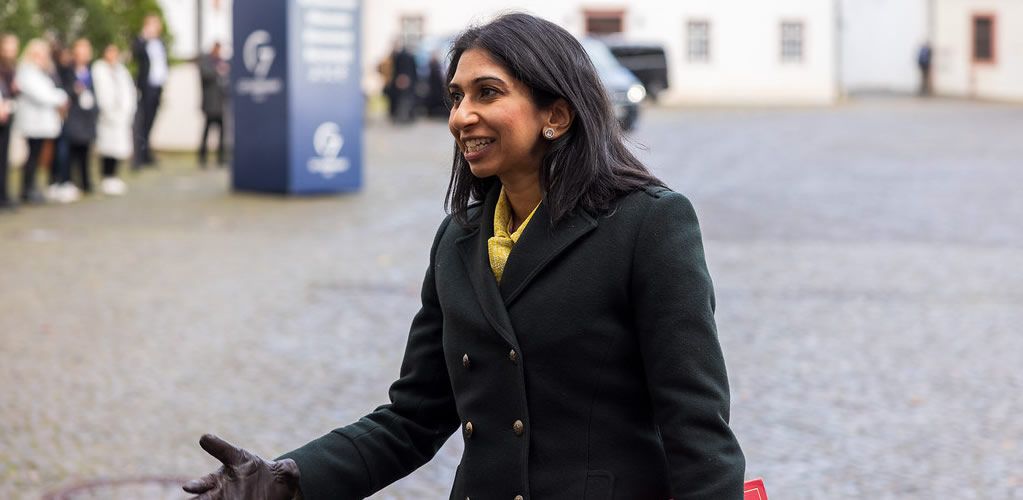Why the attorney general’s power to deal with contempt of court is a conflict of interest
The Home Secretary, Suella Braverman, is facing potential accusations of contempt of court after making comments that may impact the fairness of an upcoming trial. A situation that underscores the conflict of interest issue when politicians can initiate such proceedings in England and Wales.

The Home Secretary, Suella Braverman, is facing potential accusations of contempt of court after making comments that may impact the fairness of an upcoming trial. A situation that underscores the conflict of interest issue when politicians can initiate such proceedings in England and Wales.
T he UK home secretary, Suella Braverman, is the most recent government minister to be accused of potential contempt of court. Following a decision to charge a firearms officer with murder for the shooting of Chris Kaba in September 2022, Braverman tweeted that officers “mustn’t fear ending up in the dock for carrying out their duties.”
They mustn’t fear ending up in the dock for carrying out their duties.
— Suella Braverman MP (@SuellaBraverman) September 24, 2023
Officers risking their lives to keep us safe have my full backing & I will do everything in my power to support them. 2/3
These comments suggest that the decision to prosecute the officer is a mistake. And according to former chief prosecutor Nazir Afzal and several other experts, these comments risk affecting the fairness of the forthcoming trial, making them a possible contempt of court.
Braverman has not been officially accused of contempt, and the attorney general, who is responsible for bringing legal proceedings, has not commented. But, as I argue in recent research the fact that the attorney general would have to bring proceedings at all is a problem in itself.
In the current system in England and Wales, the person who has the power to decide whether to bring serious legal proceedings for contempt of court (including against a politician) is themselves a politician. The attorney general – a position Suella Braverman previously held – is a government minister appointed to their role by the prime minister. They exercise a number of government functions, including a virtually exclusive power to decide whether to bring proceedings under the Contempt of Court Act 1981.
The act states that a contempt occurs if a broadcast or publication (including social media posts) “creates a substantial risk that the course of justice” of active legal proceedings will be seriously impeded or prejudiced.
This is a serious matter. A person found to have committed contempt may be imprisoned for up to two years and may be given an unlimited fine. Given that several politicians in recent years have made questionable statements that have, at least, come close to interfering with legal proceedings, it’s clear that the current system is not enough to hold them to account.
Politicians and contempt of court
There have been a number of incidents where politicians have been involved in potential contempt of court. In 2016, a tweet by the then-health secretary, Jeremy Hunt, suggested the defendants in a manslaughter trial were culpable for a patient’s death. There is no indication that the then-attorney general, Jeremy Wright, considered bringing contempt proceedings against Hunt. But the risk of prejudice was such that the trial judge ordered the tweet to be immediately deleted.
Braverman’s predecessor as home secretary, Priti Patel, was accused of contempt of court on two occasions, in 2020 and 2021. Patel tweeted suggesting that those accused of people smuggling were guilty even though that had not been established in court. Again, the risk was that criminal proceedings may be prejudiced by the tweets. It is worth noting here that Braverman herself was the attorney general during both of these incidents.
Former prime minister David Cameron was involved in two instances of potential contempt. In one, he gave an interview expressing support for the celebrity cook Nigella Lawson while she was the main prosecution witness in a fraud trial. One of the defence barristers said that Cameron’s comments meant that the prime minister was “essentially a character witness for Miss Lawson” and asked for the trial to be halted, although this request was declined.
In the second, Cameron was rebuked by a judge for his comments about former News of the World editor Andy Coulson, made while a jury was still considering a criminal charge against Coulson for phone hacking. Cameron made a public apology for hiring Coulson as his director of communications, saying that Coulson had given him false assurances. This, the judge said, may have affected Coulson’s credibility with the jury.
Who should bring actions for contempt?
It is the potential for these various statements and social media posts to prejudice a trial that makes them a contempt of court concern. And the fact that they involve politicians is what makes the attorney general’s role – in deciding whether to begin contempt proceedings – a potential conflict of interest.
This is particularly the case when the person accused of contempt is the prime minister, as they appoint the attorney general. In the case of Cameron’s statement on Andy Coulson, he was advised by the attorney general of the time, Dominic Grieve. Could Grieve have impartially decided whether to bring contempt proceedings related to an apology he advised on?
It is time to remove from the attorney general the power to decide whether or not to bring proceedings for contempt. The power could be exercised by an independent official, such as the director of public prosecutions, or some other non-politician. This is the case in Northern Ireland, where the attorney general must exercise their functions “independently of any other person”.
The fact that such an important decision to bring proceedings for contempt of court is made by a politician – especially when the contempt may have been committed by a fellow politician – brings its legitimacy and impartiality into question.

Sources:
▪ Text: This piece was originally published in The Conversation and re-published in PMP Magazine on 5 November 2023. | The author writes in a personal capacity.
▪ Cover: Flickr/UK Home Office. (Licensed under a Creative Commons Attribution-ShareAlike 4.0 International License.)






[Read our Comments Guidelines]